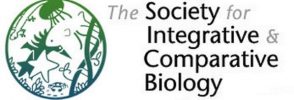Contents
- Message from the President
- Message from the President-Elect
- Message from the Program Officer
- Message from the Secretary
- Message from the Treasurer
- Code of Conduct Transparency Report
- Update from the Communications Editor
- Update from the Editor, Integrative and Comparative Biology
- Update from the Editor, Integrative Organismal Biology
- Report from Broadening Participation Committee
- What’s Up with the Student-Postdoctoral Affairs Committee?
- Report from the Public Affairs Committee
- Report from Educational Council
- Report from the Development Committee
- Report from PUI Action Group
Message from the President
L. Patricia Hernandez, president@sicb.org
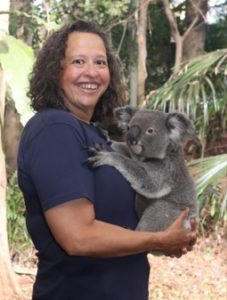
I am thrilled to announce that we are currently planning for the largest SICB meeting in our history!!! We have an exciting 5 days filled with plenaries, symposia, contributed talks, posters, and workshops to look forward to in beautiful Seattle (see Program Officer’s statement below for more specific information). This is an exciting time for SICB and as your President, I am leading a Strategic Planning mission for the Society to assure that we are doing everything we can to plan for a future that serves our entire membership while it grows in a fiscally sound manner. With the worst of the pandemic behind us we are now looking forward to how we can intelligently grow certain of our divisions that have decreased in size over the years. Key to keeping SICB strong is to do everything possible to assure that each of our divisions is thriving. We have already doubled the number of abstracts presented by some divisions that had been decreasing in the past.
Indeed, in some ways we have become victims of our own success given the strength of our Mangum Program responsible for student support. We have nearly doubled the number of students who are supported by these funds over the last ten years. However, a troublesome part of this success in attracting and supporting students is that the Mangum Fund can no longer support the number of students who have asked for financial aid from this program, and general funds have been needed to fill this financial need. Given this fact, it is now essential that we do whatever possible to refill the coffers of the Mangum Fund. To this end I would like to announce the President’s Challenge to help boost the Mangum Fund. I will be asking every single member of the Society to contribute whatever they can to help. This will serve two purposes. It will immediately help us grow the Mangum Fund, but it will also serve to attract external funding by clearly showing the commitment of our membership. I will be providing more details regarding this challenge in Seattle.
I expect that all our members will give a warm welcome to Minorities in Shark Science (MISS) who will be holding their summit with us in January. Thank you to the many members who have already volunteered to help with their assorted working groups. Hosting this talented group of shark scientists is but one of the ways that we hope to increase the overall diversity of our meetings. Study after study has shown that more diverse groups lead in innovation. Indeed, the basic structure of SICB, comprised of 12 independent divisions synergizing innovative ideas for Society-wide symposia, celebrates the creative excellence that diversity engenders. Apropos this goal, we are presently finishing up a demographic survey to track the changing nature of our membership. I fully realize that we have had members complain about what are seen as intrusive surveys, however these surveys are essential in tracking our successes in increasing diversity, inclusion, and equity within SICB. Without such surveys we will not know whether our goals are being met. I ask that each of you take the time to fill in this survey during our annual meeting. Importantly, these surveys will also allow us to better plan for serving the entirety of our membership, especially students who have long been the lifeblood of the society.
As has become our standard practice we will once again have a strictly enforced Code of Conduct during our annual meeting. We are currently working with our Safety Officer, Paula Brantner, to expedite reporting of any incidents to better serve and protect our members. (See Code of Conduct report below.)
After many long discussions we have decided to discontinue the SICB+ program. The cost was just too high and would have raised the price of registration significantly. Most importantly, we found that there simply was not the audience for the SICB+ content that we had expected. We are now making plans to record plenaries and select content from symposia, making that material available to our members. We are always striving to make our science as accessible as possible to the largest audience possible.
Finally, I want to mention that masks are welcome at the upcoming meeting. Before 2020 we had many members reaching out to ask if we could change the timing of our annual meeting because of the inevitable respiratory ailments that were associated with attending “SICKB”. I have found that wearing a mask during conferences has allowed me to completely avoid such illnesses. I will be wearing a mask during our meeting, and I ask that others consider doing so as well. I also request that we each be respectful of everyone’s choices regarding masking at the meeting.
Message from the President-Elect
Michele Nishiguchi, president.elect@sicb.org
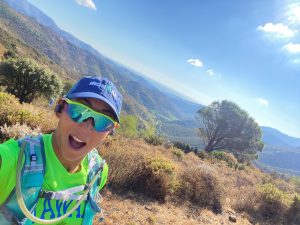
Greetings from the newbie on the block! I am excited to be involved with such a dynamic executive committee, who are all dedicated to providing an exciting and engaging annual meeting. The number and variety of oral and poster presentations are increasingly more broad and integrated throughout multiple disciplines, and I am excited to see the numbers of students who will be attending our meeting. Likewise, I had the opportunity to engage with the MISS (Minorities in Shark Science) students this past summer at UC Merced, and having them be a part of our annual meeting will promote the core principles of Equity, Diversity, and Inclusive Excellence that our society supports. We are still anxiously waiting for the outcome of our recently submitted NSF-BIO LEAPS (Leading Cultural Change through Professional Societies of Biology) proposal (led by Treasurer-Elect Brian Tsukimura, with co-PIs Susan Williams, myself, and Patricia Hernandez), which will provide additional opportunities and funding to promote EDIE principles in SICB.
As President-Elect, I am responsible for recruiting members who want to be more involved with committees throughout the society, Including SPDAC, BPC, PAC, and SSC. So if you want to get involved, and be part of the process of providing support to students to public affairs, please email me so we can get you on board. This is one way to become better engaged within SICB as well as provide guidance and experience in various aspects of the inner workings of SICB.
Message from the Program Officer
Thom Sanger, programofficer@sicb.org
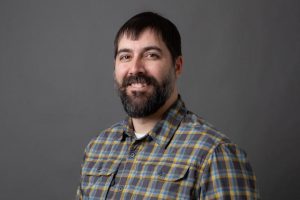
In 2023, SICB’s annual meeting returned to its pre-pandemic size with approximately 1700 presentations and 2000 meeting attendees. In 2024, SICB’s annual meeting is set to break all-time records for the number of presentations and attendees. The upcoming meeting in Seattle will host nearly 2000 scientific presentations, six plenaries, 11 symposia, approximately 15 workshops, and a large number of social and networking events. For the upcoming meeting, SICB is also partnering with Minorities in Shark Science, who are hosting special sessions and workshops for all meeting attendees. The breadth of the program demonstrates the incredible strength of integrative, organismal biology in today’s fast-paced world of science. It also demonstrates SICB’s commitment to diversity and its commitment to making our meeting welcoming to people from diverse backgrounds and identities. This is going to be an incredibly exciting meeting and I hope that everyone reading this will join us at the Seattle Convention Center in early January.
The meeting will be held January 2–6, 2024. Lots of information about travel, housing, and entertainment around the convention center is available on the meeting site. A special area of focus at the 2024 meeting will be Evo-devo and Developmental Biology. SICB established its Division of Evolutionary and Developmental Biology in 2000, the first professional organization to formalize Evo-Devo as a core discipline. At this meeting, SICB will highlight research on comparative and experimental development in invertebrates, vertebrates, and plants. There is a special invited plenary on January 3rd by Dr. Matt Harris, “Inherent capacity for change: latent developmental potential and the evolution of the skeleton.” Look at the program for the remainder of our annual plenaries, which happen every evening throughout the meeting.
This is my last newsletter piece before stepping down as Program Officer and handing the reins over to Dr. Janet Steven. I want to take this opportunity to thank everyone on the Program Committee, especially Lori Strong, over the last two years. With Lori’s constant help and lots of feedback from this committee, we successfully overhauled the society’s programming infrastructure, which had been in place for over a decade prior to this. Past President Melina Hale, President Patricia Hernandez, and the BAI staff put a lot of trust in us to pull this off without a hitch. With a few speed bumps and unexpected curves along the way, we did it! I believe that future program committees and program officers are in a good position to grow the society and integrate even more innovative ideas into the annual meeting schedule. I encourage new volunteers to step forward to help develop future meetings and continue to find new ways to make the SICB’s annual meeting larger, more diverse, and more inclusive. It is quite a rewarding experience in retrospect.
Message from the Secretary
Michele Johnson, secretary@sicb.org
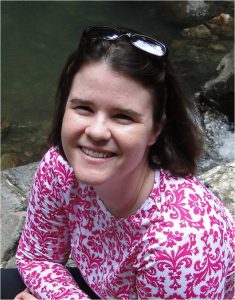
This past spring, we held elections for three society-wide officers. Vanessa Young will be our new Secretary-Elect, Matt McHenry was elected to the position of Program Officer-Elect, and David Blackburn will be the incoming Member-at-Large. Vanessa, Matt, and Dave will take office in February 2024.
Congratulations to these leaders of our society leaders, and our thanks to all members who voted! The official Election Report for 2023 officer elections is available on the SICB website.
In the spring elections, the society also voted in favor of a number of proposed amendments to our society’s bylaws. These included shifting officer terms such that they begin and end one month after the annual meeting, allowing current officers to complete meeting-related work before new officers are installed. Other amendments aimed to clarify officer roles and committee appointments.
Marianne Porter, our current Secretary-Elect (until February, when she becomes Secretary!) and I have continued to work to streamline society policies, including our new guidelines for the Best Student Presentation competitions and conflict of interest policies to govern awards and nominations, and to update officer manuals. It is our job to make sure our society’s governing documents are transparent, and that our policies are equitable. If you see an area when we can improve, please reach out to us. It’s a pleasure to serve a society so committed to supporting our membership.
Message from the Treasurer
Miriam Ashley-Ross, treasurer@sicb.org
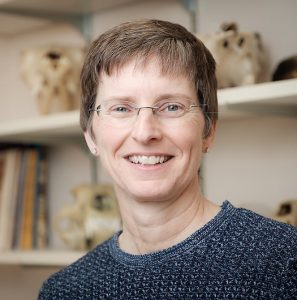
SICB is decidedly in the black. We had a terrific turnout for the Annual Meeting in Austin, exceeding our expectations. We’ve begun to make up for the losses we took on the Phoenix meeting, and based on the number of abstracts that were submitted for the Seattle meeting (1999!), we will do similarly well this year.
Your Executive Officers take their fiduciary responsibility to SICB seriously – decisions are made with the health of the Society being the primary concern, while also keeping in mind the “bang for the buck,” in other words, the value to members. You will likely have noticed a modest increase ($10) in your membership dues this year, which is aiming to solve two problems at once. First, there’s inflation – everything we do costs more, and we need our dues to keep pace with that reality. Second, there’s Divisional dues – some Divisions had them, some didn’t – but the “equalizer” was that the system we use for online payments can’t deal with any permutation of different charges for different members. The Executive Committee “solved” the problem by raising everyone’s dues by $5 that are now classified as Divisional Dues. That means all divisions will have funds available for use by the divisional officers as their membership sees fit. Going forward, expect small but regular increases in both membership dues and annual meeting registration to keep up with rising costs.
Finally, and if you’ve read my previous reports you’ll say (correctly) that I sound like a broken record, but I have to draw your attention once again to student support. A defining characteristic of SICB has always been how welcoming it is to students, and over the years we have given generous support to student members to help defray their costs of attending the meeting. I know I am not alone in saying that when I was a graduate student, I could not have attended the annual meeting every year had it not been for Mangum support! Likely because of our success in attracting students, the demand on Mangum funds keeps going up. We do have a dedicated Mangum Fund that is part of our investments, but the amount that we can draw from it (approximately $12,000 per year) doesn’t come close to the requests. Case in point: last year the requests were at an all-time high of 559, and for the upcoming Seattle meeting, the number is 625 already (and that’s before the early registration deadline!). The Executive Committee approved a total of $90,000 to be dedicated to defraying student costs, and the shortfall has to come out of our normal operating funds. There truly is no more pressing need than the Mangum Fund, so if you are thinking about making a donation, please consider directing it that way!
Code of Conduct Transparency Report
SICB has contracted with Paula Brantner of Accountability Ignited to provide virtual meeting safety services, with ongoing support for the enforcement of the SICB Annual Conference Code of Conduct and Harassment Policy.
Since 2020, SICB has received a Transparency Report to inform the SICB community about the number and types of reported Code of Conduct violations at the annual meeting. The Transparency Report summarizes incidents, outcomes, and related actions from the Annual Meeting to give a sense of how the Code of Conduct functions. Reports have been aggregated for confidentiality reasons to avoid inadvertently linking reporters or accused to incidents or disciplinary actions.
From the 2023 SICB meeting, SICB received 6 reports concerning 3 incidents. The incidents were categorized by the Safety Officer as two cases of verbal harassment, and one case of physical harassment. One case of verbal harassment was viewed as a disrespectful disruption, and the other was described as uncomfortable and bullying in nature. All complaints were handled confidentially.
Update from the Communications Editor
Molly Jacobs, comm.editor@sicb.org
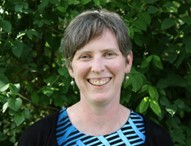
Calling all social media savvy SICB members: what platforms would you like to see SICB engage on? Up to now, SICB has primarily used Twitter (X), but we’re aware that many SICB members have diversified their social media presence recently. During SICB 2024, we’ll be surveying SICB members about their preferred social media platforms, and then using the survey results to make decisions about where to spend our effort and energy during 2024. Please watch for that survey (which will go out via email to all members, regardless of whether you attend SICB in person!), and share your ideas. You can also email me directly at comm.editor@sicb.org.
Have you checked out the SICB member updates recently? We recently debuted a new look for these informative, one page, monthly updates, and I’d love to hear feedback from SICB members. You can view the most recent (October 2023) HERE.
Update from the Editor, Integrative and Comparative Biology
Ulrike Müller, editor.icb@sicb.org
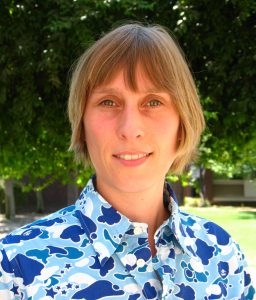
Please check out the articles arising from the symposium ‘S9 Envisioning a Diverse, Inclusive & Safe Future for Field Biology‘. All articles are free to read. ICB thanks the authors and symposium organizers for getting their manuscripts submitted to make the first issue of 2023.
ICB is offering opportunities to early-career scientists, especially PhD students and postdocs: please join our next cohort of editorial reviewers, who will perform peer reviews of several manuscripts arising from presentations at the annual meeting. Editorial reviewers are members of the ICB editorial board and are appointed for one year (renewals are encouraged). All editorial reviewers are offered training in how to perform peer reviews through a virtual workshop and through mentoring by ICB editors.
Update from the Editor, Integrative Organismal Biology
Adam Summers, editor.IOB@sicb.org
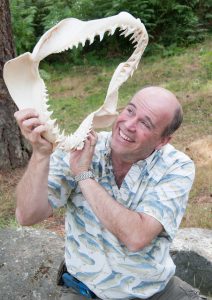
The journal continues to receive some wonderful manuscripts from the diversity of divisions in SICB. We are particularly proud of recent DNNSB and DCPB papers that have published. There are myriad open access options for SICB members, but IOB is the only choice that supports your society, has double blind review, unlimited length and figures, and supportive editors. We are looking forward to seeing your latest work in a submission.
Interested in contributing to IOB‘s upcoming special issue? Be part of our special grouping of papers headed by Yui Suzuki. The goal of this issue is to create a compilation of articles that approach organismal development from an integrative perspective.
Report from Broadening Participation Committee
Nicholas Burnett, Chair, chair.BPC@sicb.org
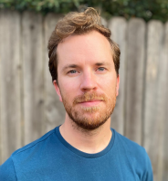
The Broadening Participation Committee is looking forward to SICB 2024! We received a $10,000 gift from the Gans Charitable Fund to fund our Professional Development Travel Awards, which provide financial support to SICB attendees to attend the annual SICB meeting. Applications closed on October 24.
We are continuing our mentoring program again for SICB 2024. Last year, we introduced options that allow mentees to self-select mentors, and we also provided helpful prompts for initial meetings between mentors and mentees. This year, we are coordinating with divisions across SICB to increase awareness of division-specific mentoring programs. We hope that communication across divisions will increase opportunities for members to participate in mentoring groups and enhance everyone’s sense of belonging in the Society, especially among early career members.
We are pleased to announce the winners of our 2024 Diversity, Equity, Inclusion, and Justice (DEIJ) Service Award. Thanks to a $1,750 gift from the Gans Charitable Fund, we were able to recognize three winners for their outstanding commitment to and promotion of DEIJ in integrative and comparative biology. The winners are:
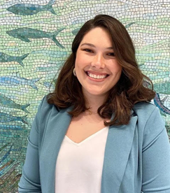
Dr. Lauren Eve Simonitis is a National Science Foundation Postdoctoral Research Fellow in Biology at both Florida Atlantic University and University of Washington. She is an aquatic sensory biologist studying ink as an antipredator defense and the olfactory system of Chondrichthyans. Her efforts to promote DEIJ in integrative biology and comparative biology include service at her institution, leadership roles in Minorities In Shark Science, and mentorship of BIPOC students and early career researchers. For her work promoting DEIJ in integrative and comparative biology, Dr. Simonitis will receive a $1,000 honorarium.

Dr. Devaleena Pradhan is an Associate Professor at Idaho State University, studying the endocrinological mechanisms by which neural, sensory and motor systems adapt to a changing external environment. Her efforts to promote DEIJ in integrative and comparative biology include extension education and outreach initiatives in her university and local community, including the Shoshone-Bannock tribe, service with groups like SACNAS, and scholarship and mentorship around the importance of gender and racial equity in science. For her work in these areas, Dr. Pradhan will receive a $500 honorarium.

Chelsea Connor is a graduate student at San Francisco State University, studying phylobiogeography of Caribbean reptile clades by integrating phylogenies with geological data on the formation of islands in the Lesser Antilles chain and the surrounding land masses. Her efforts to promote DEIJ in integrative and comparative biology include extensive community engagement, especially through the online event Black Birders Week, which she co-founded. She is also a passionate science communicator, particularly through social media, and has been interviewed in dozens of news articles and podcasts where she advocates for increasing the diversity of researchers in fields such as conservation biology and herpetology. For her work in these areas, Chelsea will receive a $250 honorarium.
What’s Up with the Student-Postdoctoral Affairs Committee?
Jason Macrander, Chair, chair.spdac@sicb.org
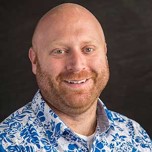
Hello from SPDAC! We are excited to see you at SICB 2024 in Seattle! We know it’s going to be a busy and exciting conference this year, and we wanted to outline some items that SPDAC is assisting with and showcasing this year to support SICB students and postdocs! This year we plan to have a workshop, a social (within a social), and a booth; be sure to come by and talk with us!
- SPDAC Job Application Preparation Working Group – Introductory Workshop: Are you curious about jobs in academia? Have you thought about what needs to go into your application? Are you able to read between the lines of the job posting? If your answer is no, maybe, or yes – don’t worry, SPDAC is hosting a workshop for you! This workshop is specifically targeted towards graduate students and postdocs that plan to apply (or are thinking about applying) in the academic job market in the 2024-2025 cycle and have not yet developed application materials. The goal of the workshop is to assist those who are thinking about the academic job market and how to develop your application package. This first meeting will result in the formation of long-term teams to support one another with monthly writing accountability check-ins and identify connections between working group participants and potential mentors within SICB. More details and a signup form will be sent out in early December to all students and postdocs that register for the conference. This workshop is limited to approximately 40 participants.
- Social within a Social: Is this your first time attending SICB? Or maybe you felt like you didn’t make connections as well as you could have at a previous SICB? Or do you just want to meet new, fun, and interesting people early in the conference this year? Come join SPDAC’s social (within a social). SPDAC committee members will be in attendance at the initial Welcome Reception (Tuesday, 8:30 PM – 10:00 PM, Arch Building – Exhibit Hall: Atrium) to chat about SPDAC, our different divisions, or any questions you may have about making the most out of your SICB experience this year! The exact location within the atrium will be disclosed during the new Student & First Timers Orientation that will take place earlier that day.
-

AI generated image: Robots attending a research conference poster session. SPDAC Booth, AI in research: SPDAC will have a booth this year with an interactive poster where you can share your ideas or concepts on using AI in research. Share your ideas with others, or come to the poster to get some ideas on how to incorporate AI into your own work. If you would like to share your own AI experience directly with SICB participants and volunteer some time at the booth, please email the SPDAC chair (Chair.SPDAC@sicb.org).
Report from the Public Affairs Committee
Tonia Hsieh, Chair, chair.PAC@sicb.org
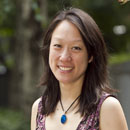
It has been a busy fall for the Public Affairs Committee, and we are excited to highlight a couple of events and activities we have queued up for SICB 2024!
First, we are thrilled to welcome Minorities in Shark Sciences (MISS) to SICB. We are working with them to hold ongoing conversations throughout the week about inclusion and diversifying STEM! In particular, in collaboration with the Burke Museum of Natural History and Culture, our annual workshop, “Improving research by inclusion of indigenous people, culture and knowledge,” will discuss how we can increase the impact of science through the inclusion and elevation of marginalized and historically excluded communities in our research and instructional activities. Our panelists will provide insight into how they personally conduct their professional endeavors to continue decolonizing science. This workshop will be held over the lunch period on Friday, January 5 and I hope you will join us!
Second, we are excited to continue our student journalism program and encourage all interested students to apply. All pieces from the 2023 meeting are featured on SICB’s website. As a part of our partnership with the Integrative and Comparative Biology (ICB) team, there is also an opportunity to create content for the ICB blog. All participants in the student journalism program are eligible to write press releases for distribution with major news outlets in future years! If interested, make sure that you check “student journalism” when you apply for Charlotte Mangum student support. All applications are due November 15th, so don’t delay!
Report from Educational Council
Veronica Martinez Acosta, Chair, chair.EdCouncil@sicb.org
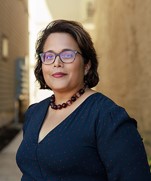
The Educational Council has been hard at work preparing for the 2024 annual meeting. We are collaborating with Jordanna Sprayberry (Muhlenberg College) for the Teaching and Learning X (TAL-X) workshop, “What is ‘scaffolding’ and how does it improve student outcomes?” We are also excited to announce the John A. Moore Lecturer for SICB’s closing plenary will be David Shiffman who is an interdisciplinary marine conservation biologist and public science engagement specialist. His talk is titled “You’re gonna need a bigger engagement strategy: Lessons learned from teaching the public about shark science and conservation.” Finally, we have selected this year’s winner of the M. Patricia Morse Award for Excellence and Innovation in Science Education. Please join us in congratulating Cindy Harley! We will present the Morse Award right before the Moore Lecture.
Please don’t forget that SICB typically has several posters and talks about education-related topics, from pedagogy to partnership & outreach. Keep an eye out for those once on the program schedule!
We are excited to announce that Ed Council will host a booth at the 2024 meeting. Stop by and chat and participate in our NEW Teaching Table Topics, where SICB faculty members offer insight on various topics of interest including – Ask a science educator!; Creative writing prompts in classrooms and research; Partnering with nonprofits to create dynamic education programs; Making a class your own – to name a few.
As a reminder, we continue to provide teaching support through maintaining databases for resources for online biology instruction. SICB’s Biology Education, Assessment, & Research Resources library (BEARR) is still currently under construction. We hope to have a BEARR up and running in the Spring. Thank you for your continued patience!
Lastly, we would still like to invite NEW Ed Council members, especially from DCPB, DCE, and DEDE. If you have suggestions please send an email to presidentelect@sicb.org.
Report from the Development Committee
Frank Fish, Chair, chair.development@sicb.org
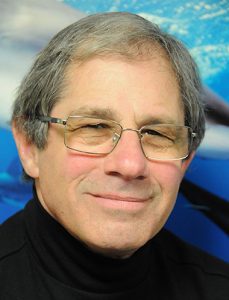
The Development Committee is asking for help from the members of SICB to continue to support the society with donations. These donations can be unrestricted or targeted to the various funds that support student attendance of the annual conference, awards to acknowledge excellence in presentations, research grants to students, or maintain operation of the society. Donations can be made through the SICB website (https://sicb.org/donations/) and can be for any amount.
To honor those current or former members of SICB, who have passed, we ask that information on the person be forwarded to SICB or the chair of the Development Committee, Frank Fish (ffish@wcupa.edu). The notification will be used as part of a presentation, In Memoriam, that will appear at the society business meeting in January in Seattle, WA. We need to show how these departed members made a contribution to the their friends, colleagues, SICB, and science.
Report from PUI Action Group
Jerry Husak, Action Group Chair, jerry.husak@stthomas.edu
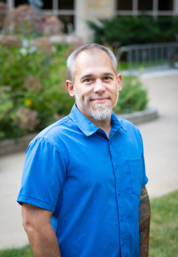
The PUI (Primarily Undergraduate Institution) Action Group will have several events at the 2024 meeting! Our informational booth will return for community building and daily activities during coffee breaks and poster sessions. We will also have an interactive poster at the Thursday (Jan 4) poster session on mentoring communities. If you’re at a PUI or want to be, stop by to learn about the mentoring communities we’ll be starting in 2024. You can help plan the structures and sign up to be a mentor or mentee. All current faculty, postdocs, and grad students are welcome to participate.
After last year’s success at PunchBowl Austin, we will have a PUI social in Seattle. Stay tuned for information on when and where!
We’ll also have some virtual meet-ups after the Seattle meeting and will send emails about those to all on our email list. If you’re interested in any of these, follow us on our X account @SICB_PUI and sign up to get on our mailing list!
